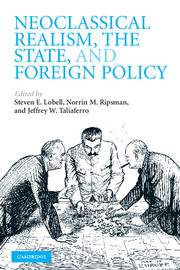Book contents
- Frontmatter
- Contents
- List of figures
- List of tables
- List of contributors
- Acknowledgments
- 1 Introduction: Neoclassical realism, the state, and foreign policy
- 2 Threat assessment, the state, and foreign policy: a neoclassical realist model
- 3 Neoclassical realism and strategic calculations: explaining divergent British, French, and Soviet strategies toward Germany between the world wars (1919–1939)
- 4 Neoclassical realism and identity: peril despite profit across the Taiwan Strait
- 5 Neoclassical realism and the national interest: presidents, domestic politics, and major military interventions
- 6 Neoclassical realism and domestic interest groups
- 7 Neoclassical realism and resource extraction: State building for future war
- 8 Neoclassical realism and state mobilization: expansionist ideology in the age of mass politics
- 9 The limits of neoclassical realism: additive and interactive approaches to explaining foreign policy preferences
- 10 Conclusion: The state of neoclassical realism
- Index
- References
2 - Threat assessment, the state, and foreign policy: a neoclassical realist model
Published online by Cambridge University Press: 05 June 2012
- Frontmatter
- Contents
- List of figures
- List of tables
- List of contributors
- Acknowledgments
- 1 Introduction: Neoclassical realism, the state, and foreign policy
- 2 Threat assessment, the state, and foreign policy: a neoclassical realist model
- 3 Neoclassical realism and strategic calculations: explaining divergent British, French, and Soviet strategies toward Germany between the world wars (1919–1939)
- 4 Neoclassical realism and identity: peril despite profit across the Taiwan Strait
- 5 Neoclassical realism and the national interest: presidents, domestic politics, and major military interventions
- 6 Neoclassical realism and domestic interest groups
- 7 Neoclassical realism and resource extraction: State building for future war
- 8 Neoclassical realism and state mobilization: expansionist ideology in the age of mass politics
- 9 The limits of neoclassical realism: additive and interactive approaches to explaining foreign policy preferences
- 10 Conclusion: The state of neoclassical realism
- Index
- References
Summary
How do states perceive international threats? Which domestic actors are the most important in threat definition? What happens when domestic actors and interests disagree on the nature of threats? As we state in chapter 1, these are central questions to the neoclassical realist agenda and require a theory of the state to answer. In this chapter I will develop a neoclassical realist theory of threat assessment to fill this gap and illustrate it with reference to the British experience between the two world wars.
Neorealist theories are theories of international outcomes. They highlight the role of polarity and international structure, black box the state, and focus on shifts in aggregate military power or threat. Debates include whether bipolar or multipolar distributions of power are more war-prone; whether anarchy encourages states to maximize relative power or security; whether equal or unequal distributions of power contribute to war; and the prevalence of buck-passing or balancing against threats.
Proponents of balance of power theory and balance of threat theory would argue that prior to World War I Britain balanced against the rising power (or threat) of Wilhelmine Germany in the form of the Anglo-French Entente Cordiale, the Triple Entente, and the naval arms buildup. Granted, prior to 1914, balancing may not have happened in an optimal fashion. Balance of power theory and balance of threat theory, at least in their current forms, predict a general tendency toward balancing and do not expect an efficient or quick balancing process under all circumstances.
- Type
- Chapter
- Information
- Neoclassical Realism, the State, and Foreign Policy , pp. 42 - 74Publisher: Cambridge University PressPrint publication year: 2009
References
- 49
- Cited by



